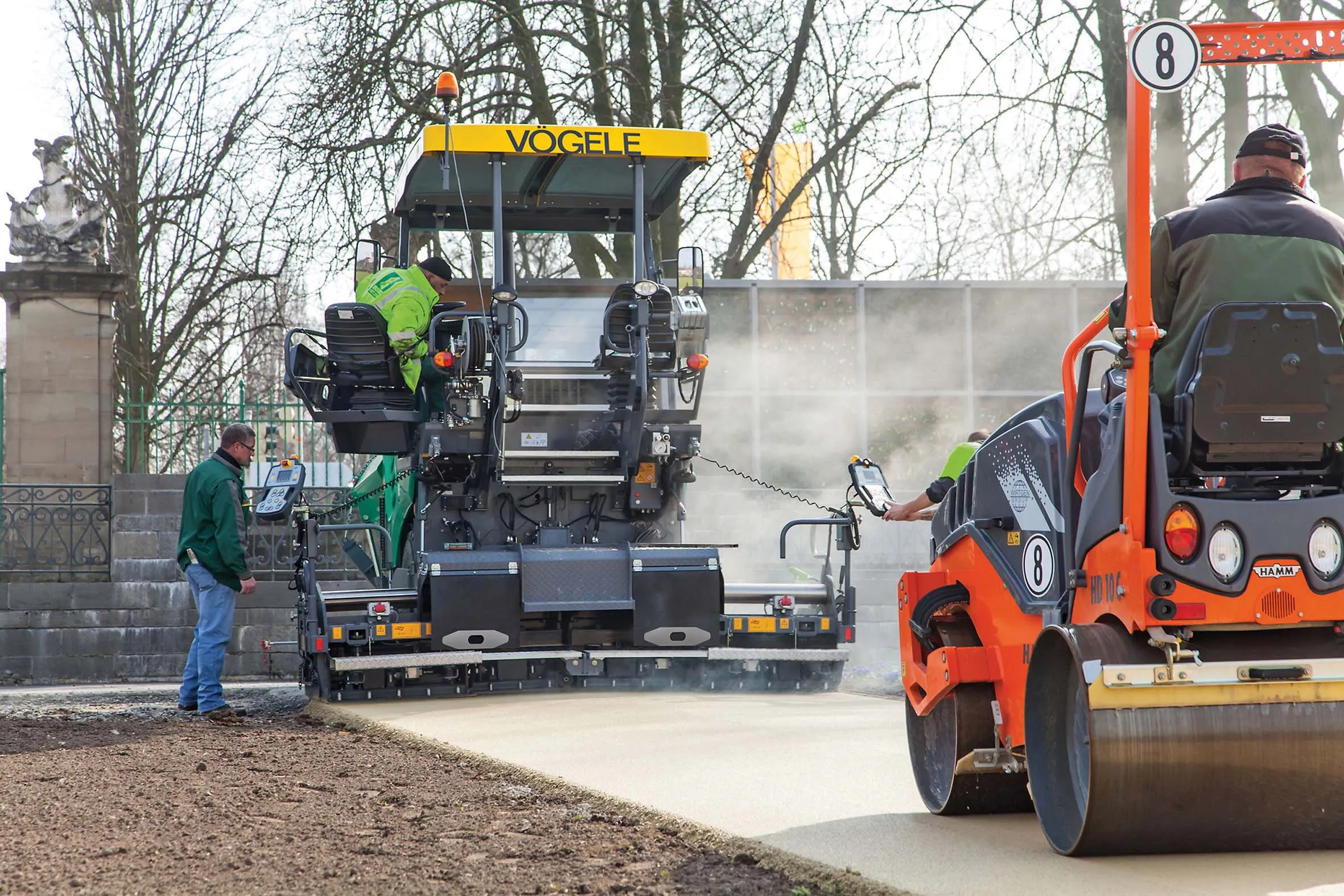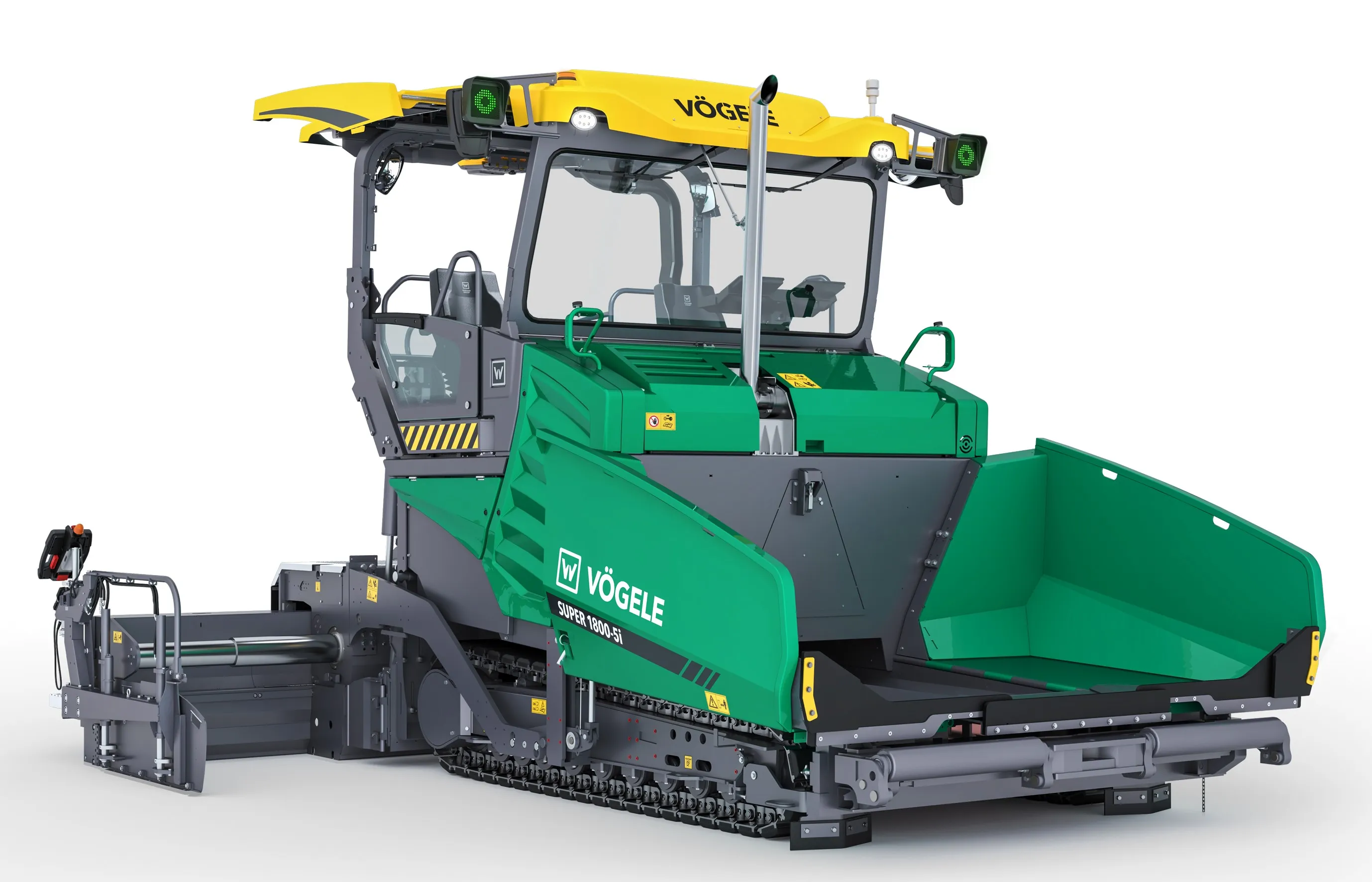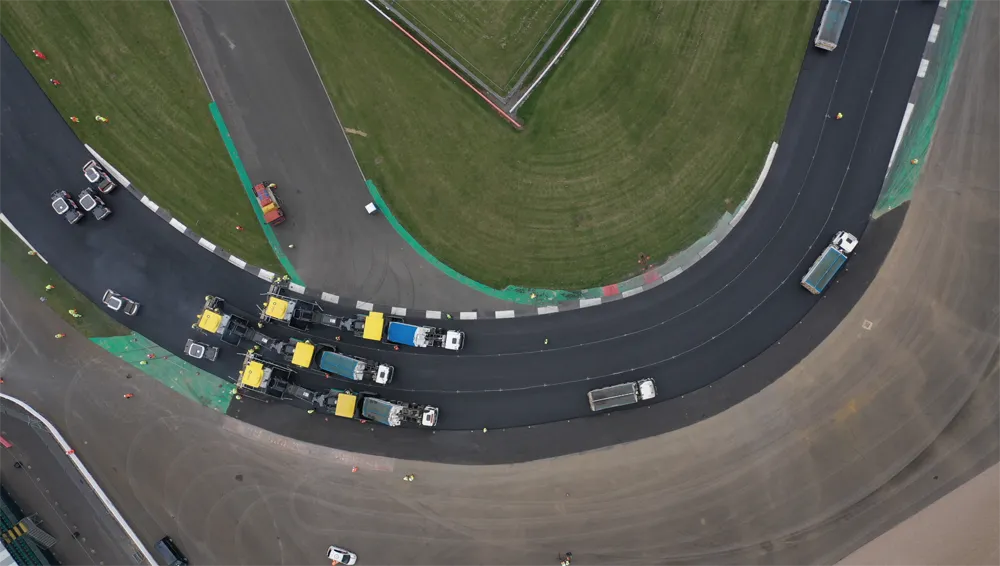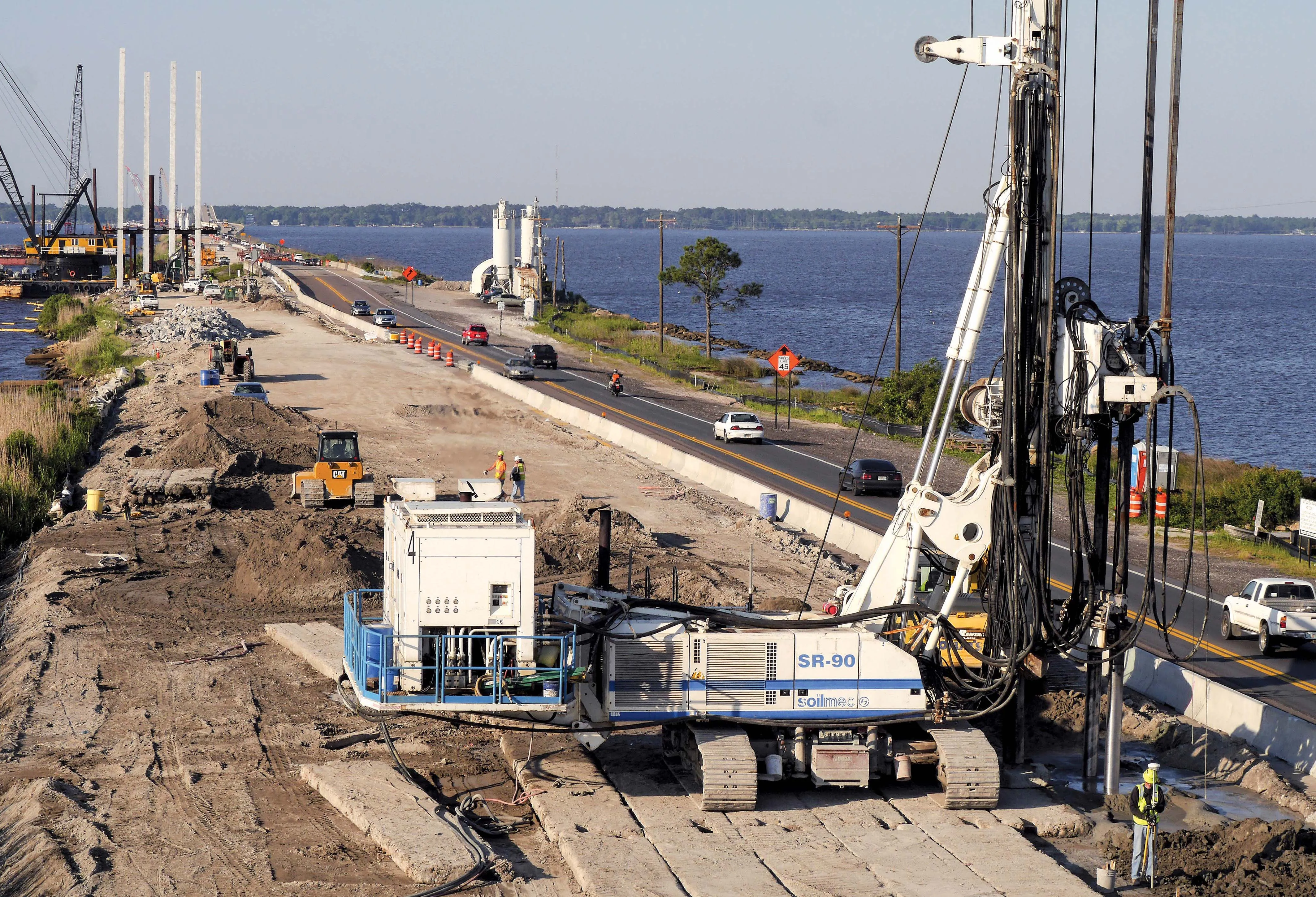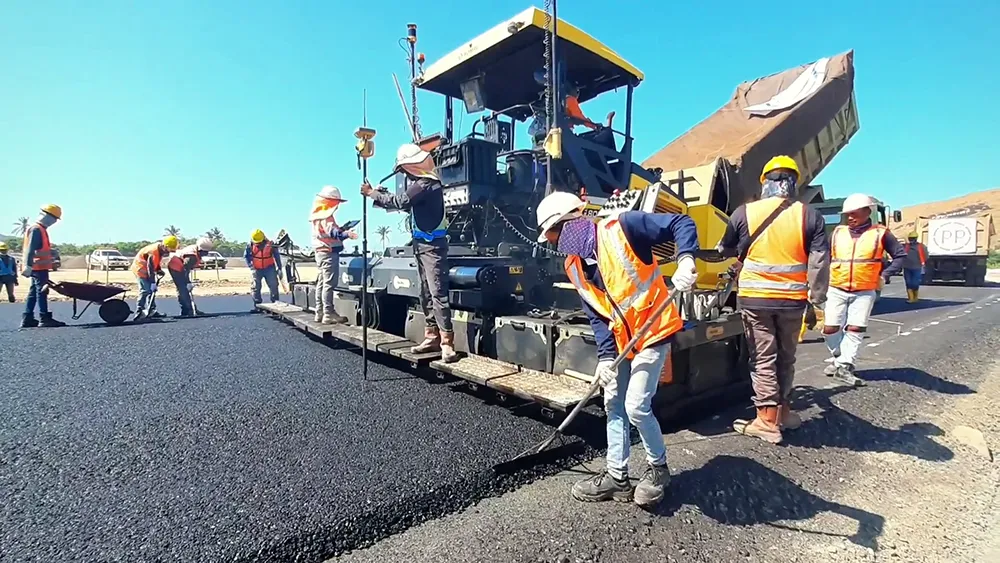
Because the surfacing work was being carried out in a road tunnel, the contractor had to minimise emissions from the asphalt. It was decided that the reduced temperature material would meet the necessary specifications for the road project, while also helping to lower emissions as required for working in a tunnel.
The strict conditions were needed to allow paving in the road tunnel under Karlsruhe’s Kriegsstrasse road. In order to reduce emissions, the contracting team opted to use machines with diesel particulate filters, as well as the reduced-temperature asphalts.
The work was carried out by a consortium combining Schleith and Züblin and by employing Vögele pavers and Hamm rollers, the team was able to meet the requirements, while delivering a quality surface in the Kriegsstrasse Tunnel.
The process of reorganising the centre of Karlsruhe around the Kriegsstrasse project has been going on since 2019. What used to be a wide road for through traffic is to become a space for pedestrians plus a tram track and an avenue of trees with cycle paths. At the same time, an underground train line is being built and through traffic is being diverted into a road tunnel 1.6km long.
The client, Karlsruher Schieneninfrastruktur-Gesellschaft (KASIG) gave a high priority to protecting the paving team for the paving of the two tunnel bores (5.3m and 6.8m wide respectively). As a result, only rollers and pavers with diesel particulate filters were allowed to work in the tunnel. The use of reduced-temperature asphalt was also specified as the paving temperature is around 30°C lower than that of conventional hot asphalt. The reduced-temperature asphalt significantly reduce fumes and temperatures to which the paving team is exposed. In addition, reduced-temperature asphalt shows a high resistance to deformation, which will be of particular benefit for a heavily-used route like the Karlsruhe road tunnel.
A number of challenges are involved in processing this mix. For the Karlsruhe project, special waxes ensured that it was possible to compact the mix at lower temperatures. However, this grade of asphalt hardens below a critical temperature, so the mix had to be paved and compacted as quickly and smoothly as possible. The contractor, Martin Paschmann Asphaltbau, used two Vögele SUPER 1800-3i pavers and three Hamm rollers: a DV+ 90i VT-S-combination roller; a DV+ 70i VV-S tandem roller; and an HD 14i VO compact roller.
In order to allow the rollers as much compaction time as possible, it was important for all the equipment to work together efficiently; Efficient paving was crucial.
The machines can achieve high laydown rates and can deliver high-quality paving of reduced-temperature asphalt. The patented heated centre auger bearing box plays an important role as it is located where the mix drops onto the auger for distribution across the width of the machine. This surface is heated evenly so that no material sticks to it. The electric screed heating ensures that the other components in contact with the mix, such as the screed plates and the compacting systems, are also heated consistently, ensuring a more even surface.
The pavers also feature effective pre-compaction due to the AB 500 and AB 600 screeds fitted to the machines used in the tunnel job. Both screeds feature tamper and vibrators as compactors. This allowed the pavers to achieve a high degree of pre-compaction and reduced the number of roller passes required. The ErgoPlus 3 control system on the pavers helped with the efficiency and quality of paving. The higher viscosity of the reduced-temperature asphalt compared to that of hot mix had an impact on the specification of roller dimensions. Using the Save paving programs function also allowed the paver operators to recall paving parameters once they had been used successfully and use them again for the next section of the project.
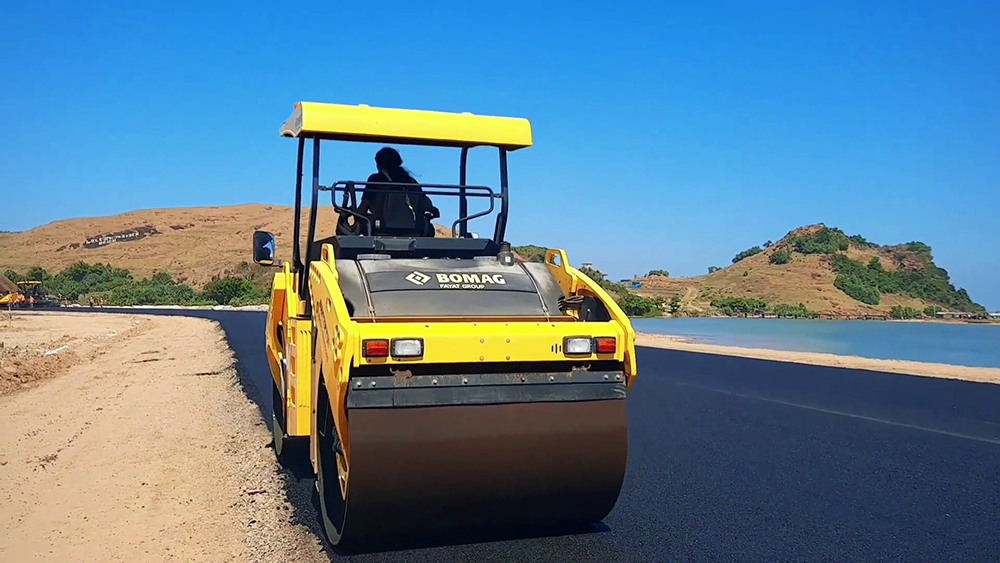
In addition to the challenges faced during paving, this project also demonstrated that, “…compared to paving hot, it is harder for the fleet of rollers to achieve final compaction because the window available for achieving final compaction is much smaller with reduced-temperature asphalts,” reported Sebastian Boldt, foreman at Schleith. The smaller window means that the roller needed to work particularly close to the paver and in short, regular runs. “This allows the rollers to generate a great deal of compacting power in the short amount of time available. However, it is also possible to compact reduced-temperature asphalt homogeneously across the whole carriageway in dynamic form, using vibrators or oscillation,” said Dr Axel Mühlhausen, application expert at Hamm. If the fleet of rollers is to consist of tandem rollers and combination rollers, thermal aprons are helpful to prevent the tyres cooling down quickly. The tunnel bores were paved with asphalt in two construction sections. “On the first really short section, we adapted the paving process and rolling patterns to suit the ease of compaction of the mix,” said engineer Christian Riede. As senior construction manager at general contractor Schleith, he co-ordinated all the asphalt work. “Although it was possible to process the reduced-temperature asphaltic concrete used for a relatively long time, it would then suddenly became hard. This instant rise in stiffness makes compaction work more difficult and is a key difference from conventional hot asphalt. This once again proves that use of the correct time window is a key factor in the success of high-quality compaction.”
The client specified medium-weight rollers for the first pass to compact the combined base and binder courses. A DV+ 90i VT-S-type Combination Roller from Hamm weighing approximately 9tonnes was used for this job. It first used its pneumatic tyres to compact the mix, which is initially susceptible to pushing. This working motion of the tyres first generates a dense structure. The drum then ensures the necessary evenness. If the roller then approaches the paver at an angle, this effectively avoids corrugation. When compacting mixes susceptible to pushing in binder, base or surface courses, the pneumatic tyres knead and work the mix without pushing it or tearing it up.
Final compaction was completed by a team involving an HD 14i VO tandem roller weighing 4.5tonnes and a centre-pivot steered DV+ 70i-VV-S tandem roller. The reduced time window meant that compaction had to be applied quickly. When paving a free asphalt surface course, the edge areas in particular need to be compressed and compacted quickly, as the asphalt has sufficient resistance to deformation. This was not necessary in the tunnel, as the course was being paved between slot gutters which were already complete.
Once the last section of tunnel had been paved, the teams from Martin Paschmann Asphaltbau and Schleith made careful checks on the work carried out. “Paving reduced-temperature asphalt is still new to a lot of people, so there is a lack of experience-based values, especially with regard to material characteristics during compaction, which was why we continuously checked density using an isotope probe. Both the measurements and the laboratory examinations carried out subsequently confirmed that we produced a high-quality, homogeneously compacted carriageway using Vögele pavers and Hamm rollers,” commented Riede.


